On September 9, the International Center for Creativity and Sustainable Development (ICCSD) held the 17th "Creativity 2030 Salon" themed on "Education for Sustainable Development". Professor Guan Chenghua, Dean of China Institute of Innovation and Development, Beijing Normal University, and Director of UNIDO Green Industry Platform China Chapter Office, and Long Yuan, Head of the Office of China Affairs of the Environmental Education Development Department of Helsinki Metropolitan Area Reuse Center in Finland, were specially invited to, based on their research results and practical experiences, jointly discuss the concept and implementation paths of Education for Sustainable Development (ESD).
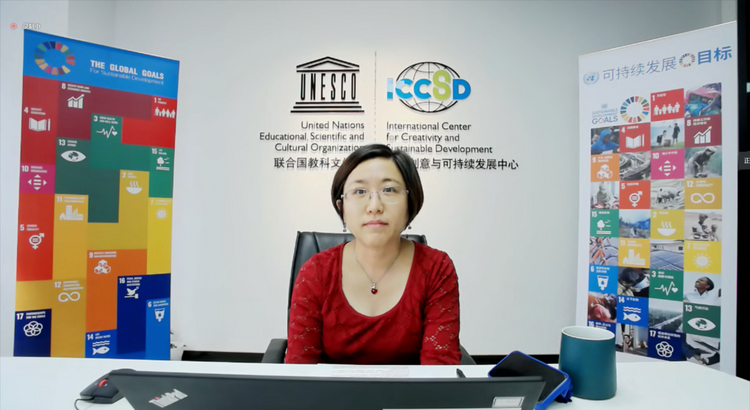
Lang Lang, ICCSD Research Manager, the moderator the salon session.
ESD is UNESCO's education sector's response to the urgent and dramatic challenges the planet faces. It gives learners of all ages the knowledge, skills, and values to address global challenges faced by the world in achieving sustainable development, including climate change and loss of biodiversity. ESD adopts the participatory teaching method to encourage and help learners change their behavioral modes and take actions to promote sustainable development.
Facing the global challenges brought by climate change and environmental issues, the UN officially launched the Decade of Education for Sustainable Development (2005-2014) in 2005. It requires governments around the world to incorporate ESD into the compulsory curriculum system as a compulsory course of basic education during the decade. At this stage, ESD has witnessed notable progress.In 2019, on the basis of the UN Decade of Education for Sustainable Development (2005-2014) and the Global Action Programme on Education for Sustainable Development (2015-2019), a new framework, i.e., ESD for 2030, was approved at the 40th session of UNESCO General Conference, and was acknowledged at the 74th session of the UN General Assembly. ESD for 2030 put more emphasis on the important role of education in achieving the Sustainable Development Goals (SDGs). It will directly contribute to achieving SDG 4 on inclusive and equitable quality education, as well as all other SDGs, with the aim of providing education with responsibility for the future at the core. The UN encourages countries' education systems to lead the changes needed for a more equitable and sustainable development path worldwide.
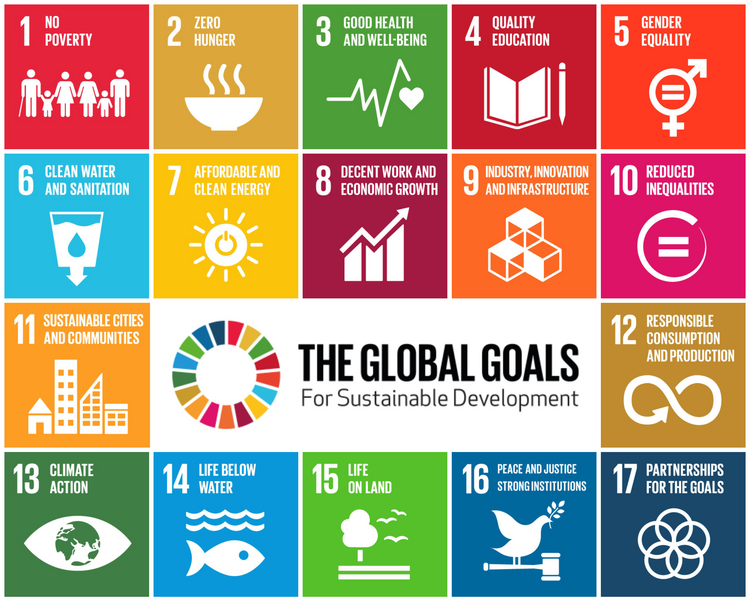
I. Adapting to the Times: Interpreting the ESD Concept
Professor Guan Chenghua: The localization of ESD in China has been closely related to the practice of green development concept in the country. In recent years, ESD has gradually become a consensus, integrated into lifelong learning which covers basic education, higher education and even civic literacy development. ESD has witnessed notable progress over the years, but there is still great room for improvement. We should strengthen ESD research, so that our education will follow the path of scientific and standardized development.
Ms. Long Yuan: ESD enables humanity to acquire the knowledge, skills, attitudes and values necessary for building a sustainable future. ESD integrates key sustainability issues such as climate change, biodiversity, poverty reduction, sustainable consumption, and natural disaster reduction into "teaching" and "learning". ESD not only includes learning content and results, but also stresses teaching methods and learning environment, and advocates encouraging learners to change their established behavioral modes for sustainable development. The ultimate goal of ESD is to make the educated take sustainable actions.
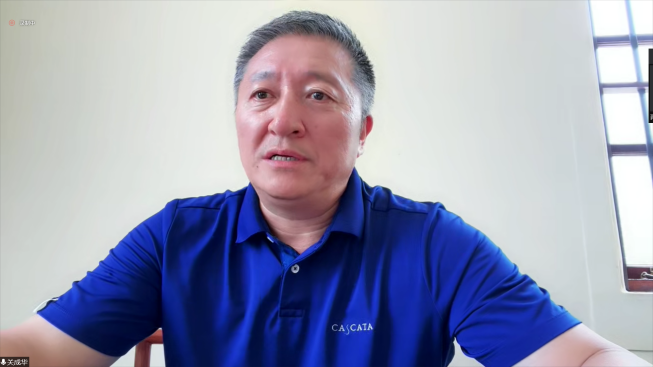
Professor Guan Chenghua from Beijing Normal University
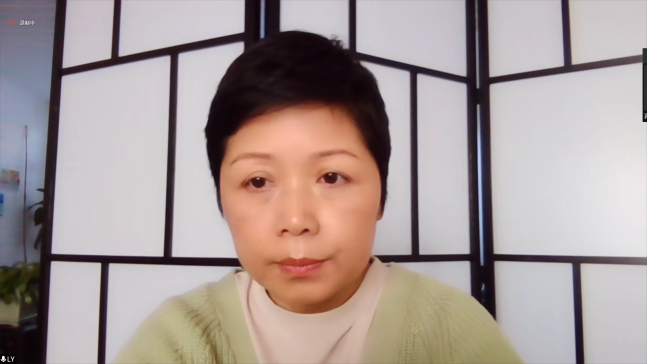
Ms. Long Yuan from Helsinki Metropolitan Area Reuse Center in Finland
II. Chinese and Foreign Experiences: Discussion on Chinese and Foreign Models of the Specific ESD Path
With the concept of eco-civilization deeply rooted in people's hearts, ESD is gradually popularized in China, but there is still much room for improvement in the construction of ESD at different learning stages. According to Professor Guan Chenghua, Finland is already at the forefront of ESD, providing many leading practical cases. ESD in China should become a pivotal part of the education concept, which is internalized into the whole process of education and growth, and more reflected in the transformation of values, lifestyles and behavioral modes, rather than necessarily limited to the fixed thinking modes of independent courses, textbooks, class hours and examinations.

Educators should be educated first to form the concept of sustainable development in their minds, and then the concept will be naturally embodied in the formulation and implementation of policies and educational activities. For the educated, to stimulate expression and creation, the practice and understanding of sustainable development are more important than memorization. Professor Guan Chenghua believed that education shall be tackled from four aspects: students, schools, parents and societies, and efforts should be made from these aspects collaboratively. With the development of various volunteer activities and other social works, the social atmosphere of ESD is also changing in China. Education should not be limited to schools, but to be extended to a wider range of social participation, so as to benefit the educated and form the concept of sustainable development in their mindsets.
Finland is a pioneer of ESD with leading-edge approaches in this field. Ms. Long Yuan shared the operation mode of ESD in Finland based on her work experience in the Institute of Sustainable Education, Helsinki Metropolitan Area Reuse Center. In Finland, ESD has been included in the basic education syllabus, and teachers of all subjects will implement sustainable development concept in course teaching. Finnish teachers have a relatively larger degree of freedom in teaching, adopting project-based teaching methods. They invite students to participate in curriculum planning and carry out teamwork, strengthening students' learning initiative, and cultivating students' critical thinking, forward-looking and collaborative competencies. More importantly, students will acquire the abilities to combine knowledge with practice.
As a teaching base for ESD in Finland, Helsinki Metropolitan Area Reuse Center shares practices of circular economy, waste sorting system, sustainable consumption and sustainable teaching methods with Finnish people of different age groups. It enriches teaching forms with textbook recycling, innovative reuse of waste materials, and planting, watering, picking, and pollination observation in gardens, enhancing the effect of ESD and achieving fruitful results in the creation of social atmosphere and the cultivation of a civic sense of responsibility.

III. Question for Discussion: Is there any regional difference in ESD
The two guests then discussed the issue of equitable education and explored the relationship between different regional economic conditions and levels of ESD. Although there are more institutions engaged in related industries and practical projects in developed areas, Professor Guan Chenghua analyzed his research results and pointed out that there is no necessary correlation between the two, and that the levels of ESD are more closely related to the policies of local governments.
Ms. Long Yuan believed that Finland's ESD is accessible to all people. In practice, whether the economy is developed or not means little for ESD. For example, in Finnish schools, not every new student can get a new textbook, and the book may be handed down by the students in a higher grade, so the subtle influence has worked since their childhood. They are encouraged to protect the books for the next session of students, thus developing a sense of social responsibility. It turned out that, in less developed countries and regions, it would be easier to promote both recycling and nature conservation practices.
While interacting with the audience, two guests answered questions on how preschool education can be integrated with sustainable development. Ms. Long Yuan showed how children could get closer to nature in courses and find their true selves in such experiences. For example, in Finland, when children learn about "water", they will be allowed to jump around in puddles when it rains to touch the natural rainwater. Professor Guan Chenghua believed that at the preschool stage, the best sustainability practice means letting children enjoy themselves to the fullest and experience the world, rather than receiving knowledge in written forms too early.
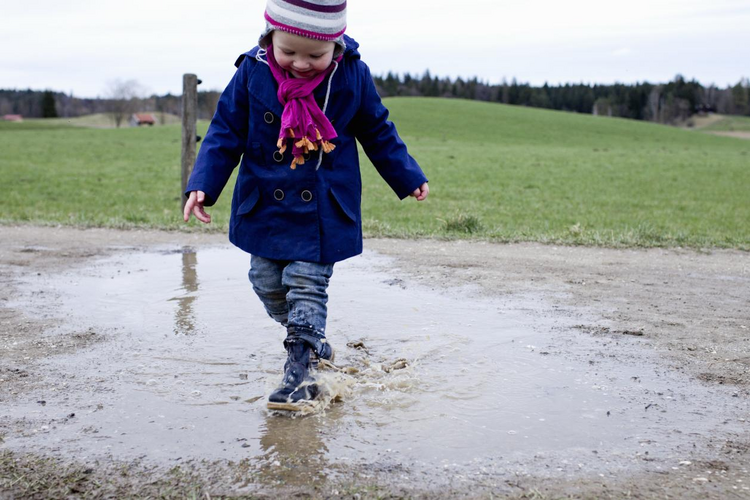
At last, the moderator Lang Lang noted that ESD is the prerequisite for sustainable development. Only when the next generation fully understand the importance of sustainable development and the relationship between development of society and environmental protection can we internalize the concept of sustainable development as the fundamental principle of our daily life, thus better bolstering the realization of SDGs.